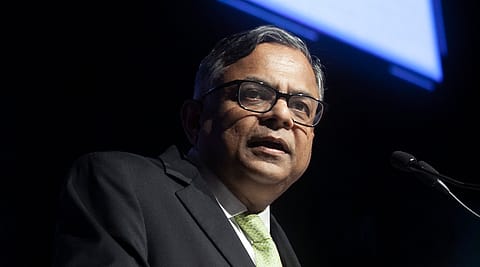Tata Sons financials to fuel 'Super App'
The 142% growth in the group holding company's profits will be ploughed into new digital and electronics businesses.

The strong profitability and stable debt of Tata Sons—the holding company of Tata group companies—will power the dreams of group chairman N Chandrasekaran to build new digital and electronics businesses. In the financial year ended March 2021, Tata Sons posted a 142% jump in standalone profit to ₹6,512 crore on a revenue of ₹19,598 crore—which slipped 21%.
Another boost is the lower debt ratios. According to the newly released annual report, the standalone net debt of the holding company was ₹27,615 crore, which stood unchanged, compared to ₹27,753.18 crore in the previous year. The gross borrowing was ₹30,334 crore vis-à-vis ₹31,603 crore. “The (standalone) net debt-to-market value of investments held by the company was at a healthy level of 0.03 times as on March 31, 2021 compared to 0.05 times as on March 31, 2020. The return on equity, pre-exceptional items, was 32.07% for the current year,” said the company in the annual report. The adjusted net debt of the entire group stood at ₹2.6 lakh crore compared to ₹2.38 lakh crore in the previous year.
In 2020-21, Tata Sons has invested in new businesses across manufacturing, services and digital platform to capitalise on future value creation opportunities, said the company. It floated three major businesses–Tata Electronics Private Limited, Tata Medical and Diagnostics Limited and Tata Digital Limited.
Recently—while speaking at the annual general meeting of the IMC Chamber of Commerce and Industry—Chandrasekaran said Tata group has already pivoted to new businesses like electronics manufacturing, 5G network equipment and semiconductors. Tata Electronics will be the umbrella company for these businesses. Tata Sons will soon pump in the investments for building the manufacturing facilities and acquiring and developing the technologies. Tata Sons has recently agreed to buy a 43.35% stake in telecom gear maker Tejas Networks Ltd for ₹1,884 crore.
Tata Digital is building a super app for retail, travel, financial services among others. It acquired 64.3% stake in online grocer Big Basket for ₹9,500 crore. It acquired digital pharmacy 1mg and signed a deal to invest up to $75 million in CureFit Healthcare. It is in talks to acquire hyperlocal delivery firm Dunzo. For supporting the e-commerce business, Tata Consumer Products has recently signed an agreement to acquire Kottaram Agro Foods—the maker of Soulfull brand of breakfast cereals and millet-based snacks.
Tata Medical will focus on manufacturing devices and developing patient-centric solutions. The investment required will be for acquiring technologies and building plants.
At its AGM, on September 14, Tata Sons will seek the shareholders’ approval for raising ₹40,000 crore by issuing non-convertible debentures (NCDs). This is a renewal of an earlier approval by shareholders for fundraising of up to ₹40,000 crores in August 2019. The capital raised will be used for funding new investments, refinancing the existing debt and working capital requirements, the company said.
Recommended Stories
“Tata Sons invested in its subsidiaries and associates based on their requirement for capital for growth and for support for deleveraging their balance sheets. The carrying cost of investments of the company as of March 31, 2021 was ₹95,806.33 crore compared to ₹84,534.78 crore in the previous year,” the annual report read. The market value of Tata Sons’ listed investments was about ₹10.3 lakh crore as of March 31, an increase of 84% compared to the previous year. The Tata Group’s combined market capitalisation as of March 31 was ₹17.8 lakh crore, an increase of 91% in one year.
In March, Tata Sons had 269 subsidiaries, 39 associates and 40 joint ventures.